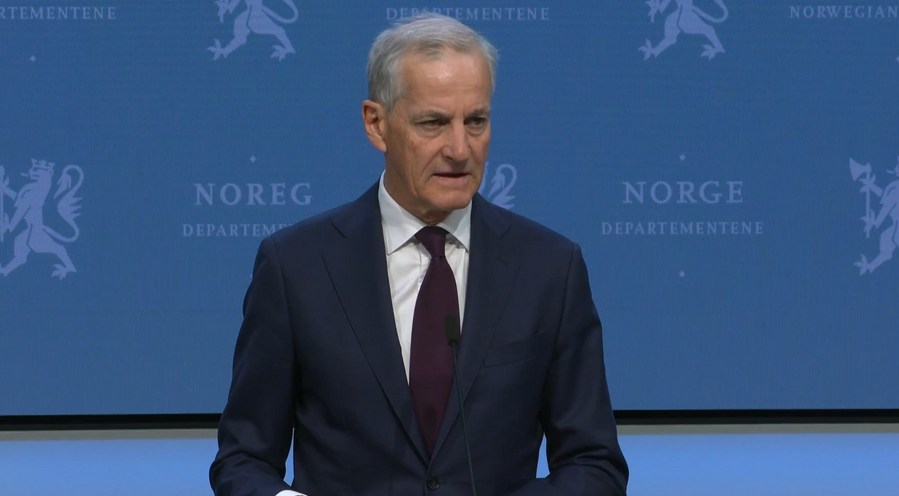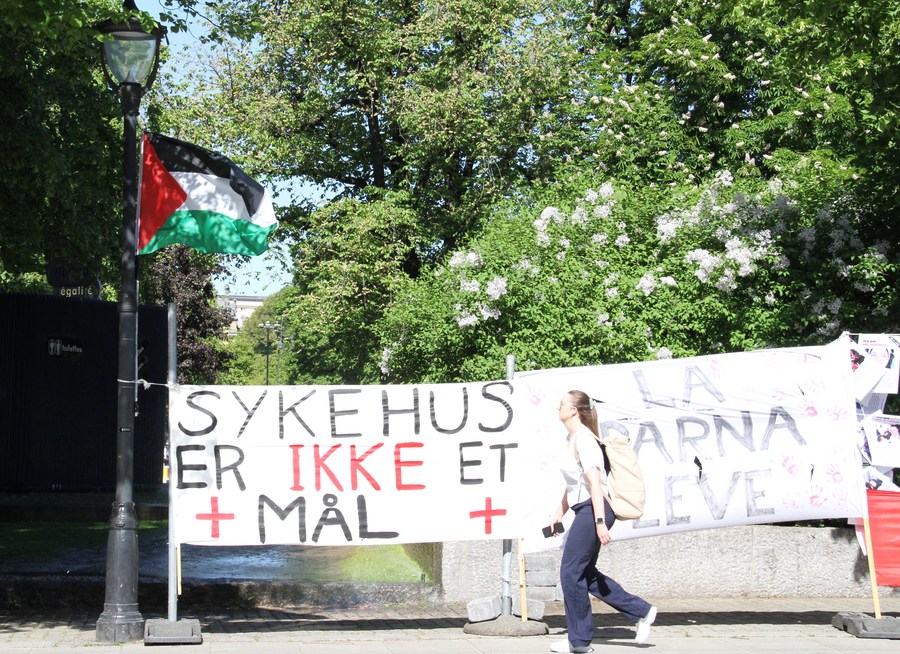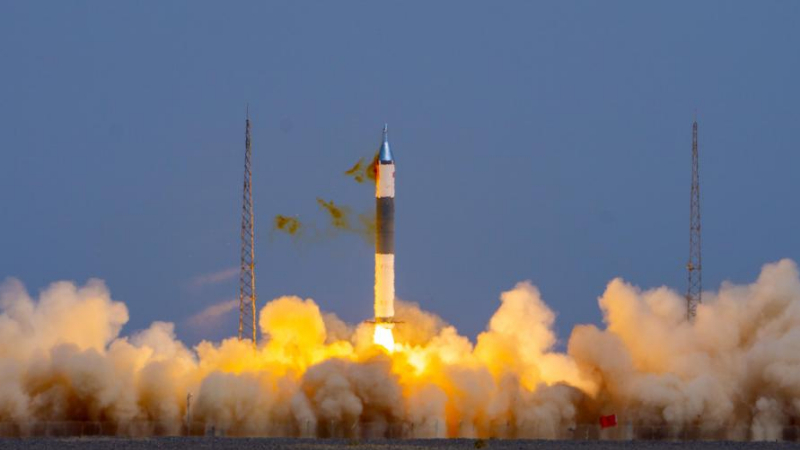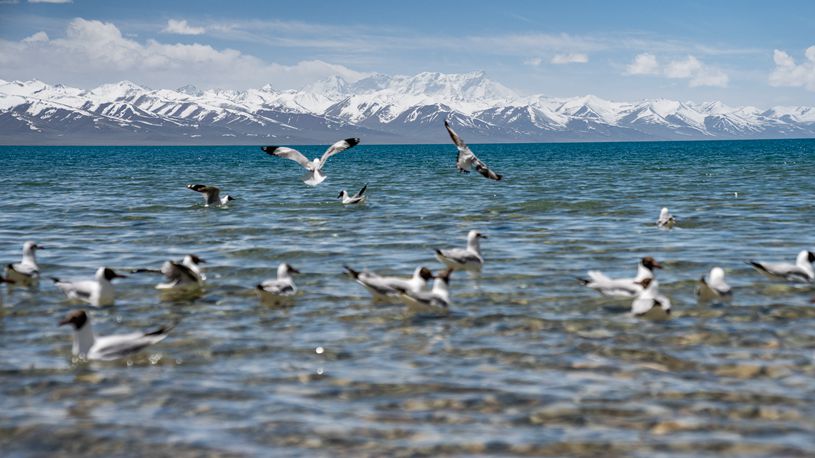
This video screenshot provided by Norwegian Government shows Norwegian Prime Minister Jonas Gahr Store attending a press conference in Oslo, capital of Norway, May 22, 2024. (Norwegian Government/Handout via Xinhua)
Norwegian Foreign Minister Espen Barth Eide highlighted the urgent need for a ceasefire in Gaza.
OSLO, May 22 (Xinhua) -- Norway, Ireland and Spain announced on Wednesday that they would officially recognize Palestine as a state.
Speaking at a press conference in Oslo, Norwegian Prime Minister Jonas Gahr Store said Norway supports granting Palestine full membership status in the United Nations (UN).
"Norway's formal recognition of Palestine as a state will enter into force on May 28. There will be no peace in the Middle East without a two-state solution. And there can be no two-state solution without a Palestinian state. In other words, a Palestinian state is a prerequisite for achieving peace in the Middle East," Store said.
He further explained that the territorial demarcation between Palestine and Israel should be based on the pre-1967 borders, with Jerusalem serving as the capital for both states. This stance is without prejudice to a final settlement on borders, which may include land swaps.
Norwegian Foreign Minister Espen Barth Eide highlighted the urgent need for a ceasefire in Gaza. "What is most urgent at the moment is to achieve a ceasefire, ensure that enough humanitarian aid reaches the people of Gaza, and obtain the release of the hostages," he said.

A pedestrian walks past a Palestinian flag in Oslo, capital of Norway, May 22, 2024. (Photo by Chen Yaqin/Xinhua)
On the same day, Irish Prime Minister Simon Harris and Spanish Prime Minister Pedro Sanchez confirmed that their countries would join Norway in recognizing the State of Palestine.
"Today Ireland, Norway and Spain are announcing that we recognize the State of Palestine, each of us will undertake whatever national steps are necessary to give effect to that decision," Harris said in Dublin, the Irish capital.
The Irish prime minister said that "permanent peace can only be secured upon the basis of the free will of a free people."
"Palestinians in Gaza are enduring the most appalling, suffering, hardship and starvation," he said. "A humanitarian catastrophe, unimaginable to most, and unconscionable to all -- is unfolding in real time."
Spain's recognition will also take effect on May 28, following a Council of Ministers session. Sanchez stressed that Spain recognizes Palestine "for peace, for justice, and for consistency," urging both parties to engage in dialogue to achieve a two-state solution. He highlighted the necessity of ending reported abuses in the occupied territories.
The Palestinian presidency on Wednesday welcomed the recognition. In a statement published by the official news agency WAFA, the Palestinian leadership stated that it highly appreciated the contribution of Norway, Ireland and Spain towards "consecrating the right of the Palestinian people to self-determination on their land and in taking actual steps to support the implementation of the two-state solution."
On the other hand, Israeli Foreign Minister Israel Katz said he has instructed the immediate recall of Israel's ambassadors to Ireland and Norway for consultations in light of the countries' decisions to recognize a Palestinian state.
"I'm sending a clear and unequivocal message to Ireland and Norway: Israel will not remain silent in the face of those undermining its sovereignty and endangering its security," Katz said in a statement on X, formerly Twitter.
VARIED EUROPEAN REACTIONS
European reactions to the recognition varied. Malta, Slovenia, and Slovakia expressed support, with Slovenia also initiating steps towards recognizing Palestine.
The Slovenian government launched on May 9 procedures for Slovenia's recognition of Palestine. Foreign Minister Tanja Fajon expressed hope that the procedures would be completed as soon as possible, as Slovenia wants to help ensure an end to the horrors in Gaza.
A spokesperson from Malta's Ministry of Foreign Affairs told Xinhua that Malta had recently affirmed its readiness to recognize Palestine but will wait until such recognition can make a positive contribution, when the circumstances are right.
Slovak Foreign Minister Juraj Blanar said his country supported the resolution on strengthening the rights of the State of Palestine. "It is the only way to achieve sustainable peace in the region and confirm the historic right of Palestine to self-determination as well as a place in the UN," he said in a statement.
Conversely, the Czech Republic, the Netherlands, and Lithuania expressed reservations.
Czech Prime Minister Petr Fiala said that it makes no sense to recognize Palestine as a state if it is not clear who represents it and on what territory.

The UN Security Council holds a meeting on the situation in Gaza at the UN headquarters in New York, on May 20, 2024. (Manuel Elias/UN Photo/Handout via Xinhua)
The Dutch government commented it does not recognize the State of Palestine and is not expected to change its position in the near future.
Lithuanian President Gitanas Nauseda warned that recognizing Palestinian statehood could escalate the conflict between Israel and Hamas.
In Belgium, top ministers also met to consider the situation in Gaza, but no agreement on a possible recognition was reached.
French Foreign Minister Stephane Sejourne said such recognition is not a taboo while stressing the timing, saying conditions had not yet been met. German Foreign Minister Annalena Baerbock also made a similar statement.
Independent EU commentator and analyst Shada Islam said that the recognition of a Palestinian state by Norway, Ireland and Spain is almost certainly going to be followed by Malta and Slovenia in the coming weeks.
"The move by Spain, Ireland and Norway will further isolate Israel in the UN... Their decision sends a strong message to Palestinian people that at least some EU member states have retained their moral compass," she told Xinhua. ■











